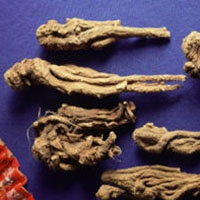
A-Z Indexes Food Health Guides
Health News |
Dong QuaiFind ProductsAlso indexed as:Angelica sinensis  © Steven Foster © Steven FosterBotanical names: Angelica sinensisHow It WorksTraditionally, dong quai is believed to have a balancing or “adaptogenic” effect on the female hormonal system. Contrary to the opinion of some authors, dong quai does not qualify as a phytoestrogen and does not appear to have any hormone-like actions in the body. This is partially supported by a double-blind trial with menopausal women that found no estrogenic activity for the herb.2 In Traditional Chinese Medicine, dong quai is rarely used alone and is typically used in combination with herbs such as peony and ligusticum for conditions such as menstrual cramps.3 Dong quai has been traditionally used as a way to promote formation of red blood cells, an effect partially supported in a case study of a man with kidney failure who had a significant improvement in anemia due to dialysis while drinking a tea composed of dong quai and peony.4 No clinical trials have examined dong quai alone for this purpose, or for the treatment of other forms of anemia. How to Use ItThe powdered root can be used in capsules or tablets.5 Women may take 3–4 grams daily in three divided applications. Alternatively, 3–5 ml of tincture may be taken three times per day. Copyright © 2026 TraceGains, Inc. All rights reserved. Learn more about TraceGains, the company. The information presented by TraceGains is for informational purposes only. It is based on scientific studies (human, animal, or in vitro), clinical experience, or traditional usage as cited in each article. The results reported may not necessarily occur in all individuals. Self-treatment is not recommended for life-threatening conditions that require medical treatment under a doctor's care. For many of the conditions discussed, treatment with prescription or over the counter medication is also available. Consult your doctor, practitioner, and/or pharmacist for any health problem and before using any supplements or before making any changes in prescribed medications. Information expires December 2026. |
